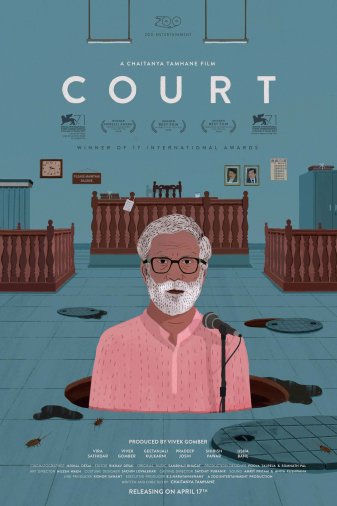Film Review | Court Asks Interesting Questions of the Indian Political System
When one thinks of courtroom dramas, one immediately thinks of American cinema. Films where lawyers in Armani suits and judges often shout or trade barbs in the vein of “watch yourself, counsellor”, “objection!” or “you can’t handle the truth!”. Indian director Chaitanya Tamhane’s Court is the direct antithesis to these films. It is an extremely understated depiction of a courtroom’s proceedings in Mumbai. The lawyers do not beat their chests in anger at the injustices taking places. Important files may become misplaced and witnesses may drop out but these occurrences are never followed up on or become a major source of drama. Court serves to highlight the slow and arduous process of a case where social injustice and corruption plays a huge role.

The film centres upon the arrest and later trial of elderly, amateur folk-singer and social activist Narayan Kamble (Vira Sathidar). Narayan’s performance of politically motivated music, criticising the bourgeoisie, is accused of causing a sewage cleaner’s suicide by drowning in the city’s waste. He hires the wealthy but intelligent and socially active lawyer Vinny Vora (Vivek Gomber) to defend him and the rest of movie documents the long-lasting trial in a Sessions Court.
Court delivers some very astute critiques of Indian culture during its Session Court sequences. The public prosecutor (Geetanjali Kulkarni) is a woman who rose to prominence from the slums. She is educated but abides by the law without lenience, despite (as Vinny states at one point) the law being ancient British colonial legislation with some ridiculous rules such as the banning of literature. The judge (Pradeep Joshi) presiding over the case similarly lacks a modern, more progressive view. He, at one point, refuses to hear a woman’s testimony because she is wearing a dress without sleeves in his presence. Police target certain people consistently for holding liberal values in conflict with the Indian government. In one scene, Vinny is seen delivering a speech to a roomful of people regarding a person he represented who, moments after being released from prison, was arrested again on a false charge. While he is telling this story onstage, he is interrupted by a man fixing a fan and is forced to stop talking, perhaps as a metaphor for the government’s silencing of radical discussion.
Throughout the film, the camera rarely moves. Instead, we see scenes play out in real time, while the camera remains in a static position. There is also no score. The only music heard is Narayan’s performances, the occasional jazz music on Vinny’s car stereo and other diegetic sounds. Tamhane does not let stylistics divert from his meticulously written script. He appears to want the viewer to absorb the story without distraction, in a way which reminded me of Michael Haneke’s work such as Code Unknown or Steve McQueen’s Bobby Sands biopic Hunger.
However, while Court asks the viewer to engage with its tale of political failure, it does not provide enough reason to engage with its characters. Naryan, the man fighting to avoid a twenty year sentence in prison, is rarely seen outside of the courtroom or onstage and when he is shown in court, he appears disinterested. It is almost like the film is screaming to the audience that he is just the catalyst to tell the story that Tamhane wants. This leads to emotional detachment within the film. Yet, emotion should really be present in order to tell a story about the human cost of a warped legal system.
At 116 minutes, the film does become a slight chore to watch. The audience’s original interest in whether the protagonist is proven innocent by his lawyer is challenged because, although one can see the subtle critiques at play, one loses interest in the people involved. The film also suffers from a tacked on ending which hammers home a point already proven in the previous hour and forty minutes.
Verdict: Writer-director Chaitanya Tamhane’s debut is an intelligent piece of work, highlighting flaws in the Indian legal system with a deft precision. However, it suffers from an overlong running time and characters who feel more like ciphers than humans.
Court will be shown exclusively in the IFI from March 25th. Check out the trailer below.
[youtube id=”4sc8z7zav9A” align=”center” autoplay=”no” maxwidth=”750"]
Featured Image Credit

